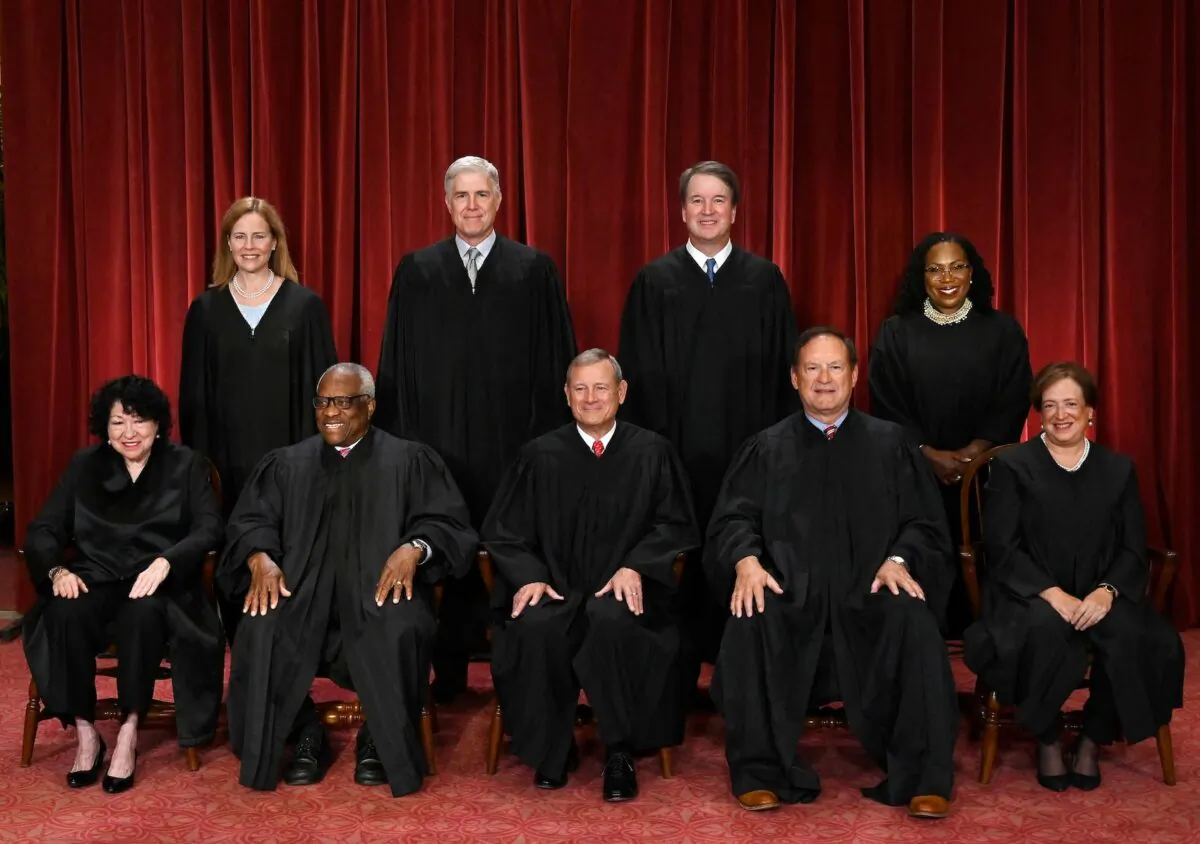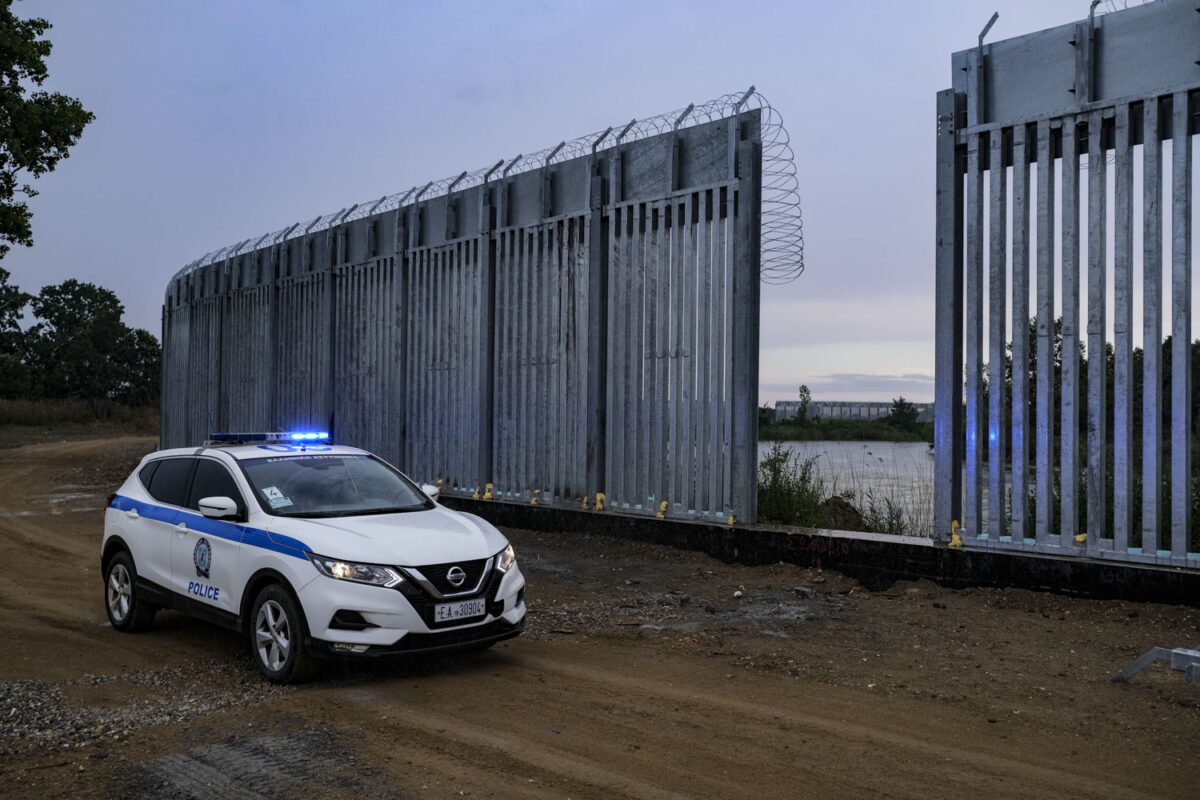Results 1 to 1 of 1
Thread Information
Users Browsing this Thread
There are currently 1 users browsing this thread. (0 members and 1 guests)
-
06-25-2023, 09:44 PM #1
Justices of the US Supreme Court pose for their official photo at the Supreme Court i

One Supreme Court Justice Dissents in Major Illegal Immigration Case

Justices of the US Supreme Court pose for their official photo at the Supreme Court in Washington on Oct. 7, 2022. (Seated from left) Associate Justice Sonia Sotomayor, Associate Justice Clarence Thomas, Chief Justice John Roberts, Associate Justice Samuel Alito and Associate Justice Elena Kagan, (Standing behind from left) Associate Justice Amy Coney Barrett, Associate Justice Neil Gorsuch, Associate Justice Brett Kavanaugh and Associate Justice Ketanji Brown Jackson. (Olivier Douliery/AFP via Getty Images)
By Jack Phillips
June 25, 2023Updated: June 25, 2023
audio available
Supreme Court Justice Samuel Alito stood alone last week in opposing a majority ruling that Louisiana and Texas lacked standing to challenge a Biden administration immigration policy.
The high court, in an 8–1 decision (pdf), ruled that the state challengers lacked standing to file a lawsuit against the Biden administration’s immigration enforcement priorities that were unveiled in 2021. Last week, Secretary of the Department of Homeland Security Alejandro Mayorkas welcomed the the order, claiming that it clears the way for enforcement guidelines that he announced at the time.
“According to Texas and Louisiana, the arrest policy spelled out in the Department of Homeland Security’s 2021 Guidelines does not comply with the statutory arrest mandates in §1226(c) and §1231(a)(2). The States want the Federal Judiciary to order the Department to alter its arrest policy so that the Department arrests more noncitizens,” Justice Brett Kavanaugh wrote for the majority. “The threshold question is whether the States have standing under Article III to maintain this suit. The answer is no.”
Kavanaugh wrote that the two states “cite no precedent, history, or tradition of federal courts entertaining lawsuits of this kind.”
But Alito disagreed, saying that the majority ignored a “major precedent” to boost “sweeping” executive power. The ruling, he also wrote, would endorse such power and accused the Supreme Court of ignoring its “virtually unflagging obligation” to exercise its mandate.
“The Court holds Texas lacks standing to challenge a federal policy that inflicts substantial harm on the State and its residents by releasing illegal aliens with criminal convictions for serious crimes,” Alito wrote. “In order to reach this conclusion, the Court brushes aside a major precedent that directly controls the standing question, refuses to apply our established test for standing, disregards factual findings made by the District Court after a trial, and holds that the only limit on the power of a President to disobey a law like the important provision at issue is Congress’s power to employ the weapons of inter-branch warfare—withholding funds, impeachment and removal, etc.,”
He also wrote: “I would not blaze this unfortunate trail. I would simply apply settled law, which leads ineluctably to the conclusion that Texas has standing.”
When the administration unveiled its immigration guidance, a federal judge last year in Texas ordered a nationwide halt to the guidance and a federal appellate panel in New Orleans declined to step in. A federal appeals court in Cincinnati had earlier overturned a district judge’s order that put the policy on hold in a lawsuit filed by Arizona, Ohio, and Montana.
“This sweeping Executive Power endorsed by today’s decision may at first be warmly received by champions of a strong Presidential power, but if Presidents can expand their powers as far as they can manage in a test of strength with Congress, presumably Congress can cut executive power as much as it can manage by wielding the formidable weapons at its disposal,” Alito also wrote. “That is not what the Constitution envisions.”
Concluding, the Bush-appointed justice wrote that the Supreme Court “exercise[s] the power conferred by Article III of the Constitution, and we must be vigilant not to exceed the limits of our constitutional role. But when we have jurisdiction, we have a ‘virtually unflagging obligation’ to exercise that authority.”
 Hellenic police patrol the new 5-meter steel fence installed along the Evros River in Poros, Greece, on June 13, 2021. (Byron Smith/Getty Images)
Hellenic police patrol the new 5-meter steel fence installed along the Evros River in Poros, Greece, on June 13, 2021. (Byron Smith/Getty Images)
Eleven months ago, when the administration asked the Supreme Court to intervene, the justices voted 5–4 to keep the policy on hold. At the same time, the court agreed to hear the case, which was argued in December.
Chief Justice John Roberts as well as Justices Elena Kagan, Sonia Sotomayor, and Ketanji Brown Jackson joined Kavanaugh. Justices Clarence Thomas, Neil Gorsuch, and Amy Coney Barrett agreed for other reasons.
“This decision is outrageous,” Texas Gov. Greg Abbott wrote Friday in a post on Twitter about their ruling, adding that the move would give the White House “carte blanche to avoid accountability for abandoning enforcement of immigration laws.”
Abbott added: “Texas will continue to deploy the National Guard to repel & turn back illegal immigrants trying to enter Texas illegally.”In a separate immigration-related decision also issued Friday, the court upheld a section of federal law that is used against people who encourage illegal immigration.
The justices by a 7–2 vote reinstated the criminal conviction of a California man, Helaman Hansen, who offered adult adoptions he falsely claimed would lead to U.S. citizenship. At least 471 people paid Hansen between $550 and $10,000 each, or more than $1.8 million in all, the government said.
He was prosecuted under a section of federal immigration law that says a person who “encourages or induces” a non-citizen to come to or remain in the United States illegally can be punished by up to five years in prison. That’s increased to 10 years if the person doing the encouraging is doing so for personal financial gain. The justices rejected an appeals court ruling that the law is too broad and violates the Constitution.
The Associated Press contributed to this report.
One Supreme Court Justice Dissents in Major Illegal Immigration Case (theepochtimes.com)If you're gonna fight, fight like you're the third monkey on the ramp to Noah's Ark... and brother its starting to rain. Join our efforts to Secure America's Borders and End Illegal Immigration by Joining ALIPAC's E-Mail Alerts network (CLICK HERE)
Similar Threads
-
Brunson Supreme Court Case Lawyer Interview. Will the Supreme Court Dump Over Half of
By Airbornesapper07 in forum Other Topics News and IssuesReplies: 1Last Post: 12-15-2022, 01:34 PM -
Trump could end up replacing 3, even 4, Supreme Court justices in his first term
By Airbornesapper07 in forum Other Topics News and IssuesReplies: 0Last Post: 10-05-2018, 08:52 AM -
Lawmakers impeach 3 Supreme Court justices
By JohnDoe2 in forum Other Topics News and IssuesReplies: 3Last Post: 08-14-2018, 02:14 PM -
Only 3% of State Supreme Court Justices in U.S. Are Latino
By stevetheroofer in forum General DiscussionReplies: 10Last Post: 04-18-2011, 03:51 PM -
9 Supreme Court Justices: Blood on their hands?
By mirse in forum Other Topics News and IssuesReplies: 8Last Post: 01-18-2009, 06:18 PM


 LinkBack URL
LinkBack URL About LinkBacks
About LinkBacks




 Reply With Quote
Reply With Quote


MS-13 gang member killing: Girl's mother testifies on illegal...
04-27-2024, 01:34 PM in Americans Killed By illegal immigrants / illegals